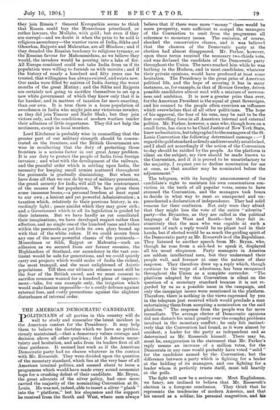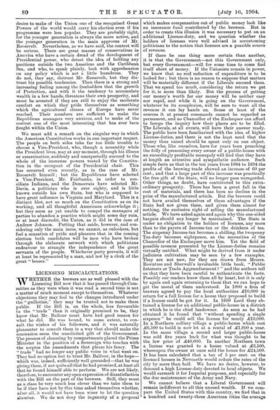believe that if there were more " money " there
weerld be more prosperity, were sufficient to compel the managers of the Convention to omit from the programme all reference to monetary issues. The omission, of course, shocked the conservative classes, and it was believed that the chances of the Democratic party at the election had almost disappeared. ' Mr. Parker. however, upon these terms received the necessary two-thirds vote, and was declared the candidate of the Democratic party throughout the Union. The news reached him while he was bathing in the Hudson, and in most candidates, whatever their private opinions, would have produced at least some hesitation. The Presidency is the great prize of American political life, and the hope of securing it has in many instances, as, for example, in that of Horace Greeley, driven possible candidates almost mad with a mixture of nervous- ness and ambition. It is now a greater prize than ever, for the American President is the equal of great Sovereigns, and his counsel to the people often exercises an influence which overwhelms that of all other politicians. The hope of his approval, the fear of his veto, may be said to be the first controlling force in all American internal and external politics. Mr. Parker, however, a man who, though born on a small farm, has risen to be Chief Justice of New York State, knew nohesitation, buttelegraphed to the managers of the St. Louis Convention the following determined message :—" I regard the gold standard as firmly andirrevocably established, and I shall act accordingly if the action of the Convention to-day should be ratified by the people. As the platform is silent on the subject, my view should be made known to the Convention, and if it is proved to be unsatisfactory to the majority, I request you to decline nomination for me at once, so that another may be nominated before the adjournment."
The telegram, with its haughty announcement of the candidate's right to maintain his own conscientious con- viction in the teeth of all popular votes, seems to have stunned the Convention, and the managers took hours to decide in what way to meet so unexpected. and un- precedented a declaration of independence. They had solid reasons for their confusion. Not only were they afraid that they might lose the vote of the entire " silverite " party—the Bryanites, as they are called in the political language of the West and South—but they felt in- stinctively that the man who was capable at such a moment of such a reply would be no pliant tool in their hands, but if elected would. be as much the guiding spirit of the Democratic party as Mr. Roosevelt is of the Republican. They listened to another speech from Mr. Bryan, who, though he rose from a sick-bed to speak it, displayed all his usual eloquence. Party managers in America are seldom intellectual men, but they understand their people well, and foresaw at once the nature of their response. They therefore drew up a reply which, though cautious to the verge of adroitness, has been recognised throughout the Union as a complete surrender. "The platform adopted by this Convention is silent on the question of a monetary standard. because it is not re- garded by us as a possible issue in the campaign, and. only the campaign issues were mentioned in the platform. Therefore, there is nothing in the views expressed by you in the telegram just received which would preclude a man entertaining them from accepting a nomination on the said platform." The response from the people was far more immediate. The average elector of Democratic opinions did not disturb his mind greatly over the complex problems involved in the monetary conflict ; he only felt instinct- ively that the Convention had found, as it were almost by accident, a leader for the party as independent and as determined as Mr. Roosevelt himself. There may be, must be, exaggeration in the statement that Mr. Parker's reply means an increase of a million votes, for the Democrats in any case would probably have voted " solid " for the candidate named by the Convention; but the difference between a party which is fighting for a, leader at the bidding of its managers, and. one fighting for a leader whom it perfectly trusts itself, must tell heavily at the polls.
The fight will now be a serious one. Most Englishmen, we fancy, are inclined to believe that Mr. Roosevelt's election is a foregone conclusion. They think that he represents the tendencies of modern America, and that his record as a soldier, his personal magnetism, and his desire to make of the Union one of the recognised Great Powers of the world would carry his election even if his programme were less popular. They are probably right, for the younger generation is always the more active, and the younger generation in the main approves of Mr. Roosevelt. Nevertheless, as we have said, the contest will be serious. There are great masses of conservatives in America who have a certain dread of the development of Presidential power, who detest the idea of holding any positions outside the two Americas and the Caribbean Sea, and who, to speak plainly, look with apprehension on any policy which is not a little humdrum. They do not, they say, distrust Mr. Roosevelt, but they dis- trust his possible tendencies. Then there is a strong and increasing feeling among the freeholders that the growth of Protection, and with it the tendency to accumulate wealth in a few hands, threatens their own prosperity, and must be arrested if they are still to enjoy the moderate comfort on which they pride themselves as something which the agricultural classes of Europe have never reached. Their numbers are sufficient to make the Republican managers very anxious, and to make of the contest one of the most interesting that has ever been fought within the Union.
We must add a remark on the singular way in which the American Constitution works in one important respect. The people on both sides take far too little trouble to choose a Vice-President, who, though a nonentity while the President lives, may at any moment, through his illness or assassination, suddenly and unexpectedly succeed to the whole of the immense powers vested by the Constitu- tion in the occupant of the Presidential chair. This has occurred even recently, as in the case of Mr. Roosevelt himself ; but the Republicans have selected a Vice-President, Mr. Fairbanks, in order to con- ciliate Indiana, and the Democrats have selected Mr. Davis, a politician who is over eighty, and is little known outside his own State, but who is supposed to have great influence in Virginia and Maryland. This is a distinct blot, not so much on the Constitution as on its working, and all thoughtful Americans acknowledge it ; but they seem as yet unable to compel the managers of parties to abandon a practice which might some day ruin, or at least discredit, the Union, as it did in the case of Andrew Johnson. Putting that aside, however, and con- sidering only the main issue, we cannot, as onlookers, but feel a sensation of pride and pleasure that in the coming election both candidates will be men who have broken through the elaborate network with which politicians endeavour to strangle the independence of the great servants of the people. Whichever party prevails, it will at least be represented by a man, and not by a clerk of the great "bosses."



































 Previous page
Previous page